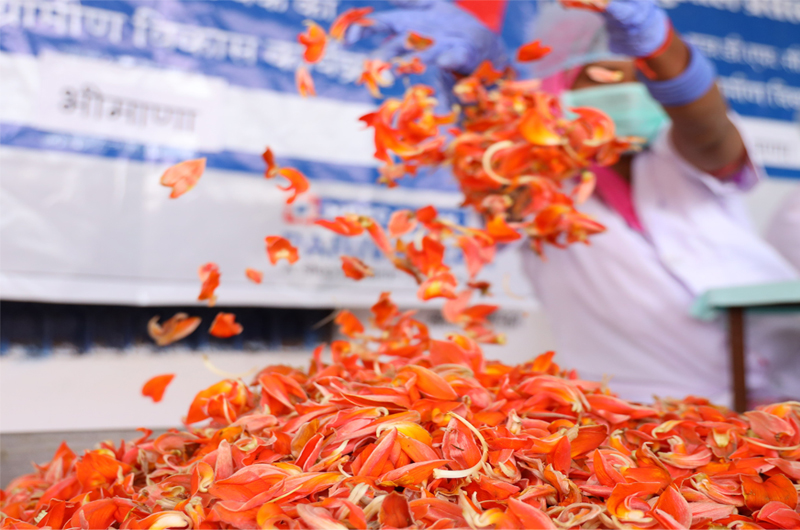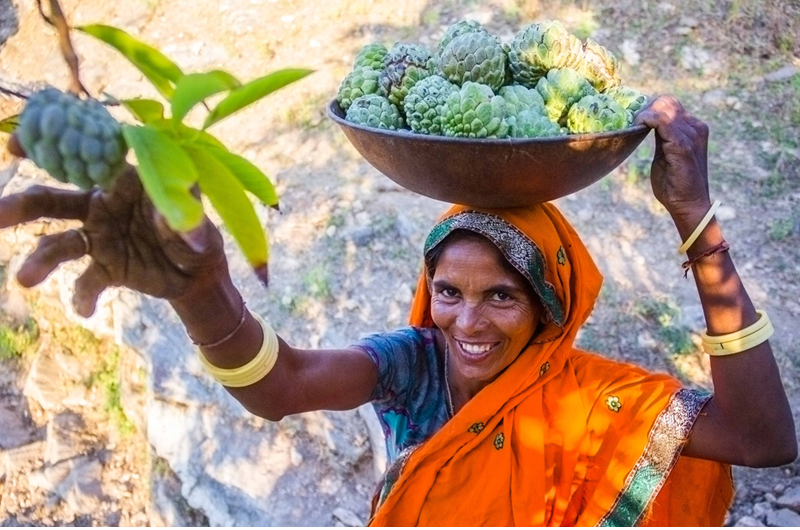Focussed on sustainable livelihoods and on environment care, Ghoomar Mahila Producer Company has brightened the prospects of tribal communities. Ghoomar and its members are committed to following careful practices to avoid harming plants and trees, and wasting food. It is an added advantage that the local tribal women who are its members are already well aware of mindful harvesting practices. Community-based strengths derived from a relationship of trust built up over several years lie at the heart of the initiative. Bharat Dogra reports
Non-timber forest produce and minor forest produce are important means of livelihood for tribal communities, but often, those who collect such produce – mostly women – are not able to get a fair price for their goods, though traders at various levels manage to earn high profit margins. Various efforts have been made over the years to improve the situation and an ongoing effort in parts of Pali and Udaipur Districts of Rajasthan has brought a lot of hope to hundreds of tribal (garasia) households.
The Ghoomar Mahila Producer Company, which has about 2000 women shareholders and hopes to increase this number significantly in the near future, focuses on several local fruits, including custard apple (sitafal), blackberries (jamun) and berries (ber). As many community members have orchards, fruits grown using natural methods can also be added to forest-based fruits and produce. Custard apple pulp (used by natural ice-cream makers and others), blackberry slices and cold drink, and berry-based products, including sweets (laddus) and lollypops, are some examples of healthy food items made with these fruits. Non-food products include natural colours derived from Palash tree flowers and other vegetation, and leaf plates and cups, again from the Palash tree.
Jitendra Kumar Meena, CEO of Ghoomar Mahila Producer Company, explains that the efforts were initially guided by the SRIJAN (Self Reliant Initiatives through Joint Action) voluntary organisation till the women farmers and forest produce collectors were able to take up responsibilities on their own. The initiative has helped women from tribal communities to increase their income significantly. Several women with whom I spoke in Bheemna (Bali Block) said in the last year they had earned between Rs 25,000 and Rs 80,000, a significant increase over the previous year’s figures. Dharmi Bai reported a Rs. 79,000 increase.
Three factors contribute to the improved earnings: From the start, Ghoomar was paying more for collecting forest produce like custard apples. As processing and value-adding activities were taken up, the company’s paying capacity increased. Thirdly, opportunities for employment in processing activities went up, helped by the training provided for workers even in village units. As several of the women shareholders are also members of self-help groups, they are able to set up small enterprises based on forest produce on their own too, which can in turn have links with the main producer company. Sani Bai, a member of the Roshni Group, for example, was given help to sell her produce directly to consumers.

bark, leaf and seed gum are used for medicinal purposes.
Another important aspect relates to sustainability of these livelihoods. Ghoomar and its members are committed to following careful practices to avoid harming plants and trees, and wasting food. It is an added advantage that the local tribal women who are its members are already well aware of mindful harvesting practices and can be further sensitised in this respect at training sessions.
However, several local people complain that agents from Delhi and other big markets, who are only interested in maximising earnings in a short time, press the hired workers to harvest the produce quickly, and this leads to indiscriminate harvesting, which in turn harms trees, cuts short the harvest season, and also results in the prematurely plucked produce going to waste. That is why ventures like Ghoomar, which are committed to sustainable livelihoods, should be encouraged by the government.
Ghoomar is planning to take up a plantation of Moringa trees and subsequently add drumstick-based items to its products list. However, its main strength lies in local forest produce, where risks are lower and sustainability prospects higher. Community-based strengths derived from a relationship of trust built up over several years lies at the heart of the initiative. The federation of self-help groups and the farmer producer company can strengthen each other. Jitendra Meena and Saddam Husain Chisti, CEO of the federation, have been working in close cooperation, brightening the prospects of collaboration between the two entities. It is hoped that the initiative becomes an inspiring model for combining sustainability and environment care with increasing livelihood prospects of tribal communities, and in the process, making healthy food available for the masses.
(The writer is a senior freelance journalist and author who has been associated with several social movements and initiatives. He lives in New Delhi.)



 from Webdoux
from Webdoux